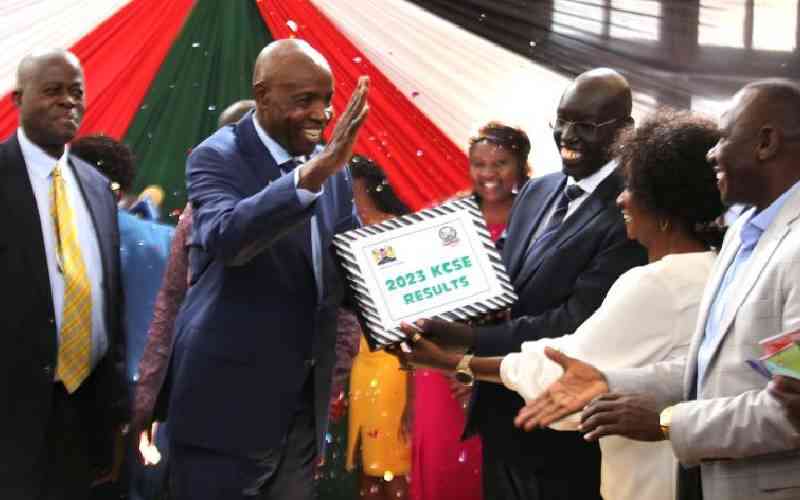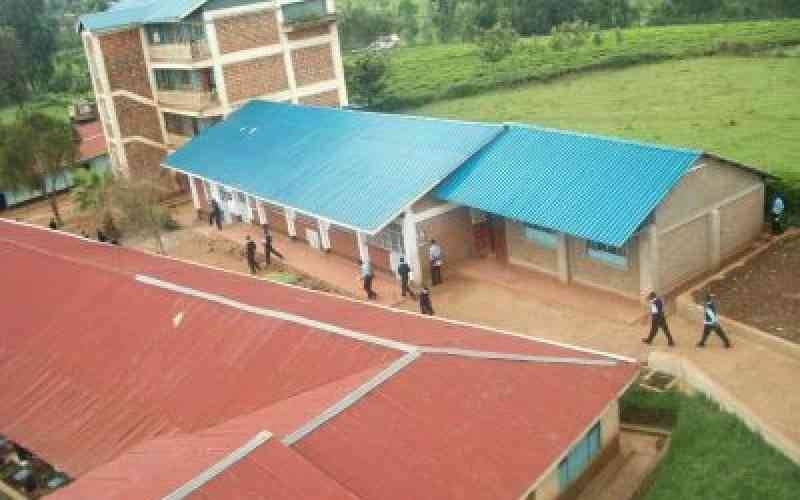Here is Education Cabinet Secretary Jacob Kaimenyi’s verbatim speech during the release of 2013 KCSE examination results:
I welcome you all to this function for the release of the 2013 KCSE Examination results but before I release the results, I wish to make some remarks on some current policy issues associated with the Education Sector.
One of these issues is the language policy.
In recent times, there has been public debate as reported in the electronic and print media that my Ministry had introduced a new language policy where the medium of instruction in primary schools was to be changed to the local languages.
To clear any doubt, I would like to state that the language policy outlined in the media reports is not new. This has been in use over the years and was adopted after being recommended in 1976 by the National Committee of Education Objectives and Policies, commonly referred to as the Gachathi Commission whose recommendation was reinforced in the Sessional Paper No. 14 of 2012 on reforming education and training sectors in Kenya.
For the Early Childhood Development Education, Pre-Primary Education and Education in Lower Primary (Class one to two) the medium of instruction should be the predominant language of the catchment area with English and Kiswahili taught as subjects from class one to class eight while in class four(4), English supersedes the language of the catchment area as the medium of instruction.
Learning theories backed by research indicate that the use of local languages as a medium of instruction in the formative years offers many advantages because it ensures smooth transition from the home to the school environment for first time school-goers.
Most of the concepts introduced in lower primary level are thus a continuation of activities that form part of the child’s play environment and as such the child learns from “known to the unknown” and new concepts are easier to grasp when taught in the local language.
It is a fact that other 3rd World Countries that have embraced learning based on their local languages have witnessed tremendous economic and social growth. Malaysia and India are live examples to this fact.
The issue of language should not therefore be viewed out of context.
Quality of Education
The introduction of Free Secondary Day Education (FSDE) was aimed at improving access and quality of education and I am delighted to note that this initiative has improved transition rates from primary to secondary education to over 75%. However, the gains made in enhancing enrolment in secondary schools are threatened by several factors some of which are perpetrated by some detrimental school management practices. Such practices include forced repetition, sending students out of school due to poor performance, introduction of unauthorized levies among others.
Government policy stipulates that no child should be made to repeat a class irrespective of their performance because this impacts negatively on retention and completion rates and by extension quality Education.
There is sufficient evidence that shows that repetition does not enhance performance and it in fact has a negative impact on quality Education. The longer children are kept in school, the poorer their performance becomes. Parents and guardians should therefore not support schools engaging in such practices which are against the Basic Education Act, the Constitution and the rights of the child.
Standard School Assessment reports from several parts of the country indicate lack of internal supervision in schools, high level of teacher and student absenteeism, high drop out rates and teenage pregnancies. These are also issues of concern that affect quality of Education negatively which need to be addressed.
Stay informed. Subscribe to our newsletter
It is important that school administrators ensure that supervision of curriculum implementation is carried out effectively in order to improve on student performance and by extension quality Education. County Directors of Education, their TSC counter parts and DEOs should therefore sensitize teachers on this crucial role in order to enhance quality in Education.
I am convinced that if each one of us plays their role as expected, we shall reap the benefits which will culminate in quality education for the Kenyan child.
Official School Enrolment Age
The issue of under age children taking both primary and secondary leaving examinations is now a major concern to my Ministry. This is because under age children are now being enrolled in schools against Government policy.
The policy on school enrolment of children as stipulated in the Basic Education Act requires that children are enrolled in standard one at the age of 6 years, which means that they take the KCPE and KCSE examination at ages 14 and 18 respectively.
The number of 12 year olds and below and 16 year olds and below who have been taking the KCPE and KCSE examinations respectively has been noted to be on the rise. In 2013, for example, there were 5,974 (1.33%) candidates aged 16 years old and below who registered for the KCSE Examination, despite the official age of candidates expected to take the KCSE examination being 18 years.
This implies that such candidates joined standard one at the age of 4 years and below instead of 6 years which is not acceptable.
I urge parents and guardians to note that the benefits of accelerating their childrens’ education are heavily outweighed by the disadvantages and stop the practice.
The field administration of the 2013 kcse examination
Turning to the release of the 2013 KCSE Examination results, I wish to make some comments on a number of issues related to the 2013 KCSE Examination before I release the results.
The field administration of the 2013 KCSE Examination was coordinated and executed by the combined efforts of Supervisors, Invigilators, Security Officers, KNEC members of staff, officials from the Ministry of Education, Science & Technology, County Directors of Education and their counterparts under TSC, DEOs, other education officials and even drivers who ensured that the administration of the examination was undertaken in accordance with the laid down rules and regulations.
To all those who played any part in ensuring the successful administration of the examination, I thank you most sincerely for a job well done.
I also wish to recognize and thank all the 11,524 examiners who participated in the marking exercise between 20th November and 24th December 2013 for their dedication and commitment in ensuring that candidates’ work was marked despite the threats to boycott the marking exercise. That was a wonderful job. Please keep it up.
My appreciation further goes out to officers from NIS, the CID, Kenya Police and the Administration Police who ensured security of examination materials as well as candidates during the examination.
The 2013 kcse examination candidature
In regard to the 2013 KCSE candidature, I am happy to note that the KCSE Examination candidature has continued to increase over the years, which is an indicator that more and more children are accessing and completing secondary education.
In 2013, a total of 446,696 candidates sat for the Examination in 7,608 examination centres which was an increase of 10,347 candidates or 2.3% when compared to 436,349 candidates who sat for the KCSE Examination in 6,968 examination centres in 2012. The increase in number of centres was 640 or a 9.2% increase when compared to 2012.
Out of the 446,696 candidates who sat for the KCSE examination, 243,668 were male, while 203,028 were female. The gender parity for the year 2013 KCSE Examination therefore stood at 54.55% Boys compared to 45.45% girls.
The counties that presented the highest number of candidates for the 2013 KCSE examination were Kiambu with 24,268 (5.43%), Nakuru 22,656 (5.07%), Kakamega 20,996 (4.7%) and Nairobi 20,713 (4.63%).
Although the percentage of boys was higher than that of girls, it is important to note that the rate at which the number of girls has been increasing over the years has been higher than that of boys and we should therefore achieve gender parity soon.
The increase of girls in the 2013 KCSE Examination was 4.00% when compared to 1.05% for boys.
While this trend is positive towards achievement of gender parity, we need to put interventions in place to ensure that the boy child is not disadvantaged and I am instructing the Education Secretary in my Ministry to put in place such interventions before it is too late.
Candidates with special needs and those under challenging circumstances
When it comes to offering opportunities to members of our society with special needs, the achievements made by Kenya as a Country have been commendable. Indeed many African countries are now benchmarking with us in the area of assessment of Sign Language curricula for learners with hearing impairments.
Despite this commendable achievement, all education stakeholders should continue to look for more innovative and even friendlier ways of teaching and assessing learners with special needs so as to ensure that they benefit fully from education offered in this Country.
In an effort to play its role on this matter, the Kenya National Examinations Council has ensured that candidates with special needs ranging from hearing, visual and physical impairments are offered appropriate examinations without discrimination.
To this end, during the 2013 KCSE Examination, a total of 819 candidates with special needs sat for the Examination as well as other candidates under difficult circumstances including 19 candidates in prison and 228 candidates in hospitals who were able to take the KCSE Examination. This is commendable on the part of KNEC.
Performance of candidates in the 2013 kcse examination
The overall performance of candidates in the 2013 KCSE Examination remained relatively at the same level when compared to that of 2012 because 27.46% of the candidates obtained the minimum university entry qualification of C+ in 2013 compared to 28.36% candidates in 2012. This was a slight drop of 0.9%. The actual number of candidates with C+ and above in 2013 is 123,365.
I wish to note that the closure of schools during last year’s General elections and teachers’ strike could have led to the slight decrease in the number of candidates scoring a grade of C+ and above in this year’s KCSE examination. I as such wish to thank teachers for their hard work which enabled performance in the examination to remain relatively the same despite the challenges faced in the year 2013.
The candidates who scored an overall mean Grade A however increased from 1,975 (0.45%) candidates in 2012 to 2,722 (0.61%) candidates in 2013 which indicates that there were more candidates who acquired quality grades in 2013.
As we celebrate those who have attained the minimum university entry qualification of C+ and above, I wish to inform all the 2013 KCSE graduants who will be receiving their results today that there exist many opportunities for them besides University education.
Majority of the candidates with a mean grade of below C+ and even those with C+ and above who will not be absorbed in our universities both private and public can be absorbed into the many middle level colleges and other TVET institutions.
Let me now turn my attention to performance by subject. An analysis of candidates’ performance in individual subjects indicates that there was improvement in candidates’ performance in 14 (45.2%) subjects out of the 31 subjects offered in 2013, when compared to 12 (38.7%) subjects in 2012.
Some of the major subjects in which performance improved were:- Kiswahili, Biology, Physics, History & Government, CRE and Business Studies. I wish to appreciate all the teachers of the subjects that recorded an improvement in performance and especially so those who teach Kiswahili and History & Government which had declined in performance in the 2012 KCSE examination.
On the other hand, there was a decline in performance in 10 (32.2%) subjects in 2013 compared to 13 (42.0%) subjects in 2012. Some of the major subjects that recorded a decline in performance were:- English, Mathematics, Chemistry, Geography and Agriculture.
English recorded the highest decline in performance in the year 2013 KCSE examination when compared to the year 2012. This decline has been attributed to the increased use of “sheng” in our schools, the consistent use of electronic communication devices such as mobile phones and computers that have done away with the need to know how to construct sentences and spell words correctly due to “spell checking” and “predictive text” capabilities.
The Directorate of Quality Assurance & Standards is hereby asked to investigate the causes of the decline in performance in these subjects and take corrective action.
As we discuss candidates’ performance, I wish to note that the number of candidates who register for the KCSE Examination but who only make an appearance during the examination and end up writing their names and index numbers only without attempting any question is on the increase.
It appears that some of these candidates are only interested in obtaining a KCSE certificate irrespective of the grade acquired, since they know that as long as one appears for the examination, the lowest mean grade one can obtain the lowest Mean Grade of E. Such a practice affects the general performance in the KCSE Examination negatively and should be discouraged.
With effect from the year 2014 examination, candidates who only write their names and do not attempt any questions shall not be graded for the very reason that they did not attempt any question.
This is a grave issue as it is not possible to go through four years of secondary education and not learn anything that is tested in the examination. Headteachers and teachers should strive to ensure that learners acquire some knowledge to be able to justify the huge investment made in education in this Country.
Indeed, the Kenya National Examinations Council should come up with the minimum acceptable mark that deserves to be graded. Why should a candidate who scores for example 5% be graded?
Examination irregularities during the 2013 KCSE examination
Despite the raft of measures put in place by My Ministry and KNEC to stamp out examination irregularities in our examinations, I am saddened to note that the vice still continues.
In the year 2013, a total of 3,353 candidates representing 0.75% of the total number of candidates who sat for the examination were involved in examination irregularities. While this may appear to be a small number when compared to the total population for the examination, it is nonetheless disturbing to note that candidates still engage in cheating during examinations despite the associated stiff penalties.
I am aware that this is not only a national phenomenon, but a global one as most countries in the world are grappling with an upsurge in examination irregularities, which is a reflection of the moral decay in today’s society, a situation we must all collectively address.
For the examination irregularities that occurred during the 2013 KCSE Examination, it was very disturbing that some Headteachers, Teachers and Education Officials who should be at the forefront of stamping out of this vice were involved in perpetuating the same. This is not acceptable and disciplinary action will obviously be taken against all those who were involved.
The highest number of candidates involved in examination irregularities during the 2013 KCSE examination were those who were involved in collusion, followed by those who were caught with unauthorized materials during the examination.
Cases of candidates being caught with mobile phones during the examination are also on the increase. I want to remind Headteachers that it is a policy directive that students should not be allowed to have mobile phones in schools at any time and it is their responsibility to ensure adherence to this policy.
Another trend in cheating that is on the increase involves candidates chewing and swallowing unauthorized pre-prepared notes when they are caught with them during the examination. One candidate was almost chocked as she tried to swallow the notes she was caught with. This shows the extent which a deviant minded candidate is able to go, which begs the question, why?
As you may recall, during the release of the 2012 KCPE examination, I observed that to enforce the KNEC Act, candidates who are involved in examination irregularities starting from the 2014 national examinations may be barred from sitting for any examination for a period of up to three years as stipulated in the Act.
I now wish to inform all future candidates that enforcement of the 2012 KNEC Act will now be done to ensure that candidates, teachers, headteachers and all other parties desist from involvement in the vice. To this end, all prospective candidates are therefore put on notice that this will be implemented fully starting with the 2014 examinations.
Stamping out cheating in examinations cannot be solely achieved by My Ministry and KNEC. Every Kenyan of good-will including parents has a part to play to ensure that our education system is safeguarded so that our qualifications can continue to be held in high esteem. Parents and guardians in particular must not abdicate the responsibility of nurturing their children to schools as schools left alone cannot fully inculcate values in children.
I wish to note that the upsurge in cheating during the 2013 KCSE examination has been attributed to the slow resolution of Court cases for the eighty eight (88) and the one hundred and thirty three (133) persons arrested and charged with involvement in examination irregularities in the years 2012 and 2013 respectively. I will therefore be making a request to the Chief Justice for fast tracking of the cases so that the convictions of those found to be guilty can serve as a deterrent measure to those who may want to engage in the same in the future.
I also wish to pass a strong warning to schools and especially National schools that involve themselves in examination irregularities despite their advantaged position of having the brightest minds and the best teaching & learning facilities that cheating in examinations will not be tolerated and will be dealt with firmly.
All the above notwithstanding, I wish to applaud and thank the teachers, parents, guardians and candidates in the 7 counties where there were no examination irregularities recorded, namely:- Taita Taveta, Lamu, Turkana, Bomet, Laikipia, Kajiado and Baringo.
 The Standard Group Plc is a
multi-media organization with investments in media platforms spanning newspaper
print operations, television, radio broadcasting, digital and online services. The
Standard Group is recognized as a leading multi-media house in Kenya with a key
influence in matters of national and international interest.
The Standard Group Plc is a
multi-media organization with investments in media platforms spanning newspaper
print operations, television, radio broadcasting, digital and online services. The
Standard Group is recognized as a leading multi-media house in Kenya with a key
influence in matters of national and international interest.
 The Standard Group Plc is a
multi-media organization with investments in media platforms spanning newspaper
print operations, television, radio broadcasting, digital and online services. The
Standard Group is recognized as a leading multi-media house in Kenya with a key
influence in matters of national and international interest.
The Standard Group Plc is a
multi-media organization with investments in media platforms spanning newspaper
print operations, television, radio broadcasting, digital and online services. The
Standard Group is recognized as a leading multi-media house in Kenya with a key
influence in matters of national and international interest.








